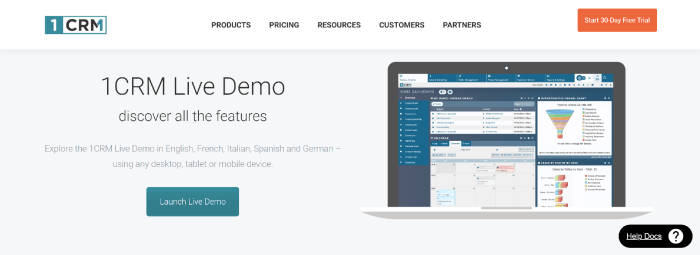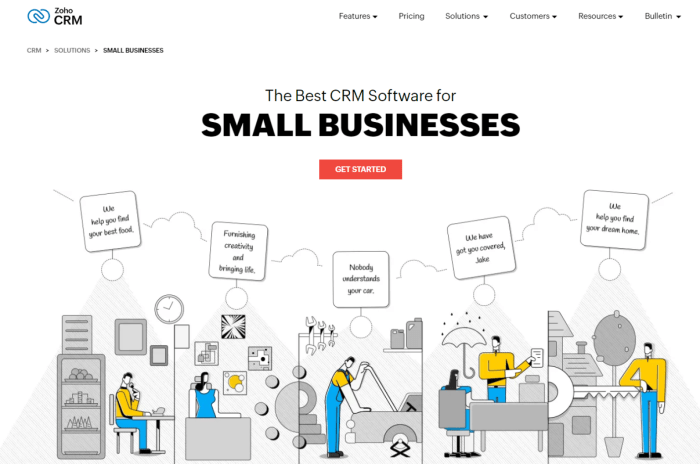Best crm software for large business – Choosing the right Customer Relationship Management (CRM) software is crucial for large businesses. A robust CRM system streamlines operations, improves customer interactions, and ultimately drives revenue growth. However, with a plethora of options available, selecting the ideal platform can feel overwhelming. This detailed guide explores the key features to consider, the leading CRM solutions for large enterprises, and factors to ensure successful implementation.
We’ll delve into aspects like scalability, integration capabilities, customization options, and pricing models, empowering you to make an informed decision.
Understanding the Needs of Large Businesses
Large businesses have unique CRM requirements that differ significantly from those of smaller enterprises. Scalability is paramount. The system must handle vast amounts of data, numerous users, and complex workflows without compromising performance. Integration with existing enterprise systems, such as ERP (Enterprise Resource Planning) and marketing automation platforms, is also critical for seamless data flow and operational efficiency.
Furthermore, robust security features are essential to protect sensitive customer data, complying with regulations like GDPR and CCPA.
Key Features for Large Business CRMs:, Best crm software for large business
- Scalability: The ability to handle increasing data volumes and user numbers without performance degradation.
- Customizability: Flexibility to tailor the system to specific business processes and workflows.
- Integration Capabilities: Seamless connection with other enterprise software, such as ERP, marketing automation, and e-commerce platforms.
- Advanced Reporting and Analytics: Detailed insights into customer behavior, sales performance, and marketing effectiveness.
- Robust Security Features: Protection of sensitive customer data through access controls, encryption, and compliance with data privacy regulations.
- Workflow Automation: Automating repetitive tasks to improve efficiency and reduce manual errors.
- Multi-channel Support: Managing interactions across various channels, including email, phone, social media, and chat.
- Sales Force Automation (SFA): Streamlining sales processes, from lead generation to closing deals.
- Customer Service Management (CSM): Efficiently handling customer inquiries, resolving issues, and tracking support interactions.
- Mobile Accessibility: Access to CRM data and functionalities from any device.
Top CRM Software for Large Businesses
Several leading CRM platforms cater specifically to the needs of large enterprises. The optimal choice depends on your specific requirements and budget. Here are some of the top contenders:

Source: cllax.com
1. Salesforce Sales Cloud
Salesforce is a market leader, offering a highly scalable and customizable CRM solution. Its extensive features, robust integration capabilities, and vast ecosystem of apps make it a popular choice for large businesses. However, it can be expensive and requires significant implementation expertise.

Source: pttrns.com
2. Microsoft Dynamics 365
Microsoft Dynamics 365 provides a comprehensive suite of CRM and ERP solutions seamlessly integrated with other Microsoft products. Its user-friendly interface and strong integration capabilities make it attractive to large organizations already invested in the Microsoft ecosystem. Pricing can vary significantly depending on the modules selected.
3. SAP CRM
SAP CRM is a powerful solution designed for large, complex organizations. Its strength lies in its deep integration with other SAP enterprise applications, making it ideal for companies already using the SAP ecosystem. It is known for its robust functionality but requires specialized expertise for implementation and maintenance. This is often a more expensive option.
4. Oracle Siebel CRM
Oracle Siebel CRM is a mature and feature-rich platform known for its strong capabilities in customer service and sales force automation. It is particularly well-suited for large businesses with complex sales processes and a need for advanced analytics. It’s a robust solution but may require significant investment in training and customization.
5. HubSpot CRM
While often associated with smaller businesses, HubSpot’s CRM offers scalability features suitable for larger organizations, particularly those focused on inbound marketing and sales. Its all-in-one approach, combining CRM, marketing automation, and sales tools, can be a significant advantage for integrated workflows. The pricing structure can be more affordable than other enterprise solutions, but scalability may require more careful planning and potentially additional integrations.
Choosing the Right CRM: Key Considerations
Selecting the best CRM involves careful evaluation of several factors:
- Business Needs: Clearly define your specific requirements, including sales processes, customer service workflows, and reporting needs.
- Scalability: Ensure the chosen CRM can handle your current and future data volumes and user numbers.
- Integration Capabilities: Verify compatibility with your existing enterprise systems.
- Customization Options: Assess the level of customization required to align the CRM with your business processes.
- Pricing Model: Compare different pricing structures, including subscription fees, implementation costs, and ongoing maintenance.
- Vendor Support: Evaluate the vendor’s reputation, customer support services, and training resources.
- Security and Compliance: Verify that the CRM meets your security and data privacy requirements.
Implementation and Ongoing Management
Successful CRM implementation requires careful planning and execution. This includes:
- Data Migration: Transferring existing customer data to the new CRM system accurately and efficiently.
- User Training: Providing comprehensive training to all users to ensure proper adoption and utilization.
- Customization and Configuration: Tailoring the CRM to your specific business processes and workflows.
- Integration with Existing Systems: Seamlessly connecting the CRM with other enterprise applications.
- Ongoing Maintenance and Support: Regular updates, system maintenance, and ongoing technical support are essential.
Frequently Asked Questions (FAQ)
- Q: What is the average cost of a CRM for a large business? A: The cost varies significantly depending on the chosen platform, the number of users, and the required features. Expect to invest a substantial amount, ranging from thousands to hundreds of thousands of dollars annually.
- Q: How long does it take to implement a CRM for a large business? A: Implementation timelines can range from several months to over a year, depending on the complexity of the project and the size of the organization.
- Q: What are the key metrics to track after CRM implementation? A: Key metrics include customer satisfaction, sales conversion rates, lead generation, customer lifetime value, and return on investment (ROI).
- Q: How can I ensure user adoption of the new CRM system? A: Effective training, clear communication, and ongoing support are crucial for successful user adoption. Involve users in the implementation process and address their concerns promptly.
- Q: What are the risks associated with a poorly implemented CRM? A: Risks include data loss, decreased productivity, low user adoption, and ultimately, a failure to achieve the desired ROI.
Conclusion: Best Crm Software For Large Business
Choosing the right CRM for your large business is a strategic decision with significant long-term implications. By carefully considering your specific needs, evaluating different platforms, and planning for a successful implementation, you can leverage the power of CRM to enhance customer relationships, streamline operations, and drive sustainable growth. Remember to prioritize scalability, integration, security, and user adoption throughout the process.
References
Call to Action
Ready to transform your customer relationships and drive business growth? Contact us today for a free consultation to discuss your CRM needs and explore the best solution for your large enterprise.
General Inquiries
What are the typical costs associated with large-business CRM software?
Costs vary widely depending on the vendor, features, number of users, and implementation services. Expect a range from several thousand dollars annually to significantly more for enterprise-level solutions.
How long does it typically take to implement a new CRM system in a large organization?
Implementation timelines depend on the complexity of the system, the size of the organization, and the level of customization required. Expect a process ranging from several months to over a year.
What are the key performance indicators (KPIs) to track after CRM implementation?
Key KPIs include sales conversion rates, customer acquisition cost, customer lifetime value, customer satisfaction scores, and sales team productivity.
How can we ensure data security and privacy with a large-business CRM?
Choose a vendor with robust security measures, including data encryption, access controls, and compliance with relevant data privacy regulations (e.g., GDPR, CCPA).
